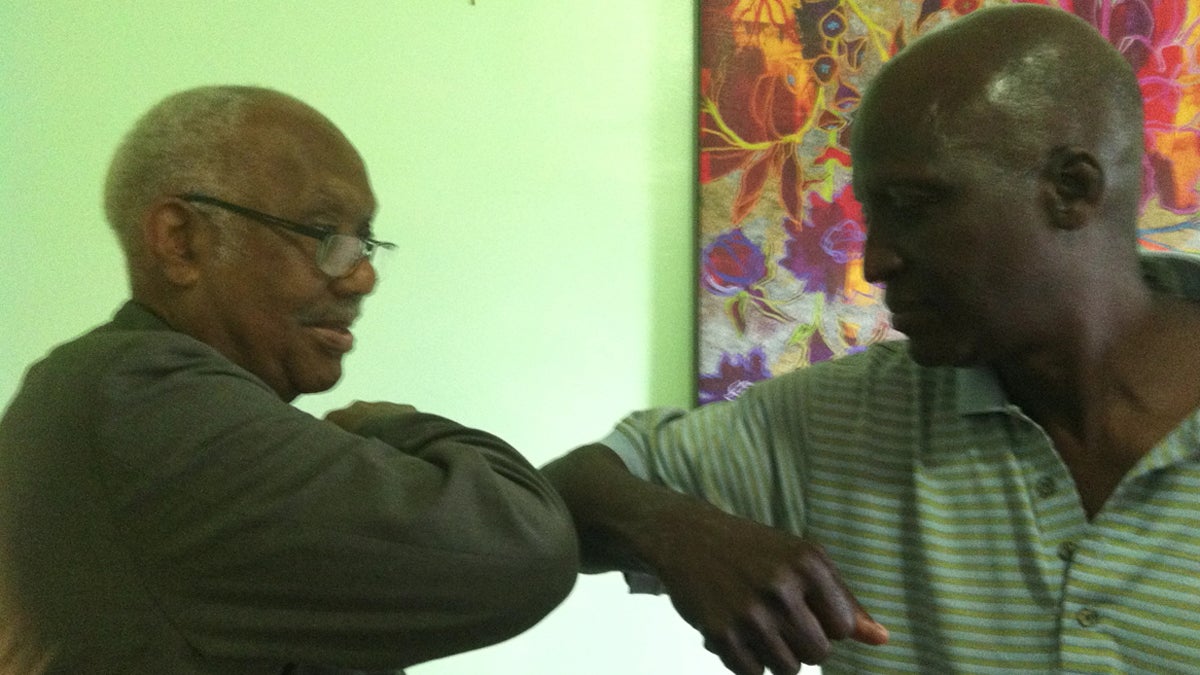Ebola outbreak abroad spurs informal ‘self containment’ precautions among some recent arrivals to Philly
Listen
Francis Horton and Voffee Jabateh demonstrate the 'Ebola handshake' meant to minimize contact. (Elana Gordon/WHYY)
The Ebola outbreak in Liberia and other parts of West Africa has hit home for many in Philadelphia who have close connections to that region. The Rev. Solomon Muin, a leader with the Liberian Ministers Association of the Delaware Valley, recently lost a mentor and some close childhood friends to the virus who unknowingly cared for someone infected with Ebola.
“The entire family died of it, and when I heard it — I mean, it was heartbreaking for me,” said Muin.
Such deaths also have Muin and others in Philadelphia acting to curb potential stigma and fears within local immigrant communities. And for some, that’s meant informally taking extra preventive steps, beyond the general guidelines, when loved ones arrive from Ebola-affected countries.
‘Self containment’
Every year when Voffee Jabateh’s longtime family friend makes his trip to Philadelphia, the two immediately schedule a visit. But when Jabateh’s friend arrived a few weeks ago, there was a delay.
“When he came in town, he called me and said ‘I’m here, I’m just calling to tell you I’m here, but I won’t be able to see you until 21 days,'” Jabateh said.
Twenty-one days is the maximum incubation period for Ebola symptoms to develop. Jabateh says, at first, it was hard to take his friend’s request seriously because he assumed that since he had been allowed to travel to the U.S., he was fine.
But Jabateh’s friend, Francis Horton, told him to stay away. “I wanted to make sure that I’m all right,” he said.
Horton says he truly did not think he’d been exposed to the virus, but he wanted to be extra safe. So he stayed to himself and avoided loved ones for 21 days. Diana McIntosh, Horton’s daughter, actually suggested the precaution.
“Being concerned that I had children, for our health and well being, we saw this as a necessity,” she said.
Horton stayed at his daughter’s home, in his own room with its own bathroom. Family members never touched, but Horton says some would stop in, leave food and talk.
“I said, ‘No, I have no problem,’ and so there was a meeting of the minds,” said Horton. “You’re doing it because of the consciousness of the need to protect others.”
It’s not clear how common this informal self-quarantining is, but at least some new arrivals to the region are doing it. Others are avoiding public gatherings and even the longstanding custom of embracing one another. A prominent Liberian ministers group in Pennsylvania is encouraging recent arrivals from countries with Ebola to take similar steps.
Jabateh, who directs the African Cultural Alliance in West Philadelphia, says his attitude changed after watching his friend take these precautions. He also wants to quell any community concerns after a man in Texas was diagnosed with Ebola and then died.
A ‘conservative’ approach
But despite the heightened public attention and concern, there’s a very low risk for the disease and its spread in the United States, according to Jeffrey Duchin, chief of the Seattle Health Department’s communicable disease program.
“The more people understand that this disease does not spread casually or easily, I think the more comfortable they’ll feel with their safety,” Duchin said, while in Philadelphia for a national infectious disease conference. “This isn’t really a high-risk situation for general public.”
The Centers for Disease Control and Prevention recommends that people traveling from countries with Ebola monitor their health daily and contact a doctor if symptoms come up. Duchin says Horton and others’ self-containment practices are more conservative, but “there’s nothing wrong with that, if it can be done without hardship. But it does go a little bit beyond what the CDC is recommending for asymptomatic persons from high-risk areas.”
As for Francis Horton, he saw his 21 days as a small price to pay for total assurance that he and others were OK. He joked that it was nice not having to do the dishes, but then became more serious. The block of time allowed him to get a lot of writing done.
“I prepared this which is for an appeal for combating, preventing and eradicating the Ebola virus in Liberia,” Horton said, while taking a document out of his bag.
And even though he and Jabateh have a lot of catching up to do, he took time during their first face-to-face meeting to read him his proposal.
WHYY is your source for fact-based, in-depth journalism and information. As a nonprofit organization, we rely on financial support from readers like you. Please give today.

